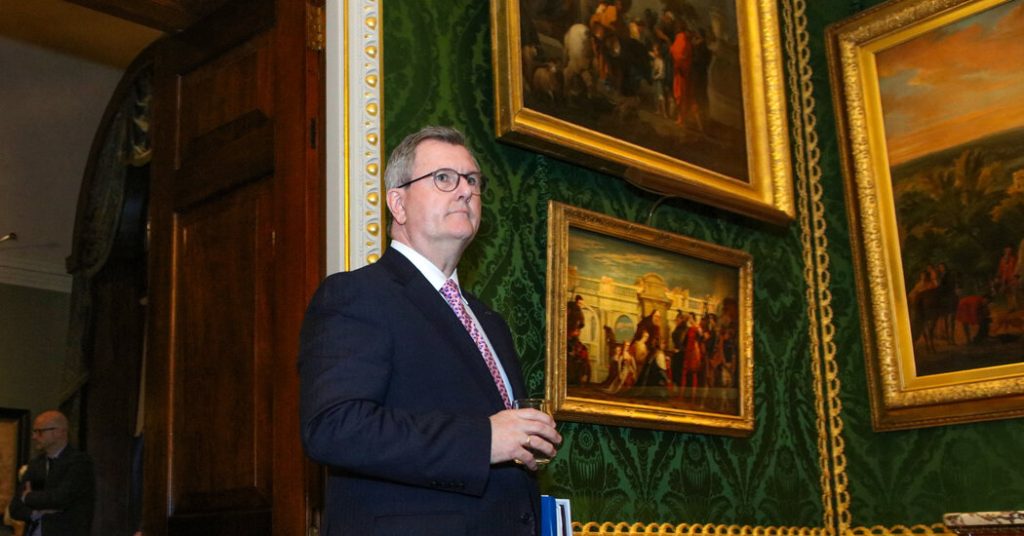Jeffrey Donaldson, leader of the Democratic Unionist Party and one of Northern Ireland’s most prominent and influential politicians, resigned his leadership of the party on Friday, after being charged with “historical” sex offenses.
The resignation, which sent shock waves through Northern Irish politics, was announced in a statement from the D.U.P., which said it was also suspending Mr. Donaldson as a party member pending a judicial process.
The party said that it had received a letter from Mr. Donaldson, the longest-serving member of Parliament in Northern Ireland, “confirming that he has been charged with allegations of an historical nature and indicating that he is stepping down as leader.”
Earlier on Friday the Police Service of Northern Ireland said that it had “charged a 61-year-old man for non-recent sexual offenses.” It added that “a 57-year-old woman was also arrested and charged at the time for aiding and abetting additional offenses.”
In line with British police practice, the statement did not state the identities of those charged, but said they would appear in a magistrates court on April 24.
Mr. Donaldson’s social media accounts, including his profiles on X, LinkedIn and Instagram, appeared to have been deleted on Friday morning.
The D.U.P., whose members are mainly Protestant, wants Northern Ireland to remain part of the United Kingdom, and Mr. Donaldson is a member of the British Parliament in London. He was honored with a knighthood for political service by Queen Elizabeth II in 2016.
Once seen as a hard-liner, he opposed the 1998 Good Friday Agreement that brought peace to Northern Ireland after decades of bloody sectarian violence known as the Troubles, which pitted mainly Protestant unionists who wanted to remain part of the United Kingdom against mainly Catholic nationalists who wanted Northern Ireland and the Republic of Ireland to unite.
Earlier this year, after two years of political gridlock in Northern Ireland, Mr. Donaldson helped negotiate and promote a deal that restored the government. For the first time, the job of first minister went to a member of Sinn Fein, a party with historic ties to the Irish Republican Army that represents mainly Roman Catholic voters and campaigns for a united Ireland.
Northern Ireland’s assembly, known as Stormont, can only function with the support of the biggest parties from across the sectarian divide, requiring the participation of both Sinn Fein and the D.U.P.
In 2022, the D.U.P. walked out in protest over post-Brexit trade arrangements, causing the collapse of power-sharing.
When the assembly was finally restored earlier this year, Michelle O’Neill of Sinn Fein secured the top job because her party had come first in the last Northern Irish elections, and the D.U.P., which won fewer votes, had to settle for the deputy first minister job. Although the two posts have equivalent powers, it was a significant moment that marked the changing political landscape in Northern Ireland.
In theory, Mr. Donaldson’s departure should not impact the running of the Northern Ireland Assembly, where the deputy first minister role is held by the D.U.P.’s Emma Little-Pengelly.
However, Mr. Donaldson was seen as an architect and strong supporter of the deal to share power with Sinn Fein, which caused deep divisions within the ranks of the D.U.P., a significant number of whose members opposed rejoining the power-sharing assembly.
In its statement the D.U.P. said party officers had unanimously appointed Gavin Robinson as interim leader following the resignation.
Jim Allister, leader of the smaller Traditional Unionist Voice party, which fiercely opposed the resumption of power sharing, called for renewed opposition to that decision.
Mr. Donaldson’s resignation had “very wide ramifications for unionism,” Mr. Allister said in a statement on social media, referring to the cause of maintaining Northern Ireland’s place in the U.K. “Unionism was already divided by the ‘Donaldson Deal’. This needs to be a cathartic moment for unionism,” he wrote.
But Julian Smith, a former secretary of state for Northern Ireland, praised the appointment of Mr. Robinson, who had been the D.U.P.’s deputy leader, as the interim replacement for Mr. Donaldson.
Mr. Robinson had “played a key role in a tough negotiation to restore power sharing,” and “along with other D.U.P. colleagues will chart a positive course for the future,” he said.


